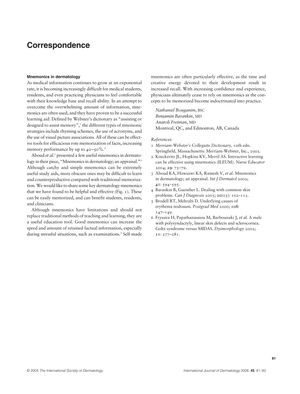Mnemonics in Dermatology
January 2005
in “
International Journal of Dermatology
”

TLDR Mnemonics help improve memory in dermatology by up to 50%.
The document discusses the use of mnemonics as a learning aid in dermatology, highlighting their effectiveness in improving memory performance by 40-50%. Mnemonics, which include rhyming schemes, acronyms, and visual associations, can be particularly beneficial for medical students, residents, and physicians to manage the vast amount of medical information. The authors share several dermatology mnemonics they find helpful, such as "TOP HAT" for non-scarring alopecia and "SOAP BRAIN MD" for diagnosing Systemic Lupus Erythematosus. While mnemonics should not replace traditional learning methods, they are a valuable tool for retaining information, especially under stress, like during exams. Self-created mnemonics can be especially effective due to the personal effort involved in their creation. As physicians gain experience, they may rely less on mnemonics as the concepts become ingrained in their practice.





